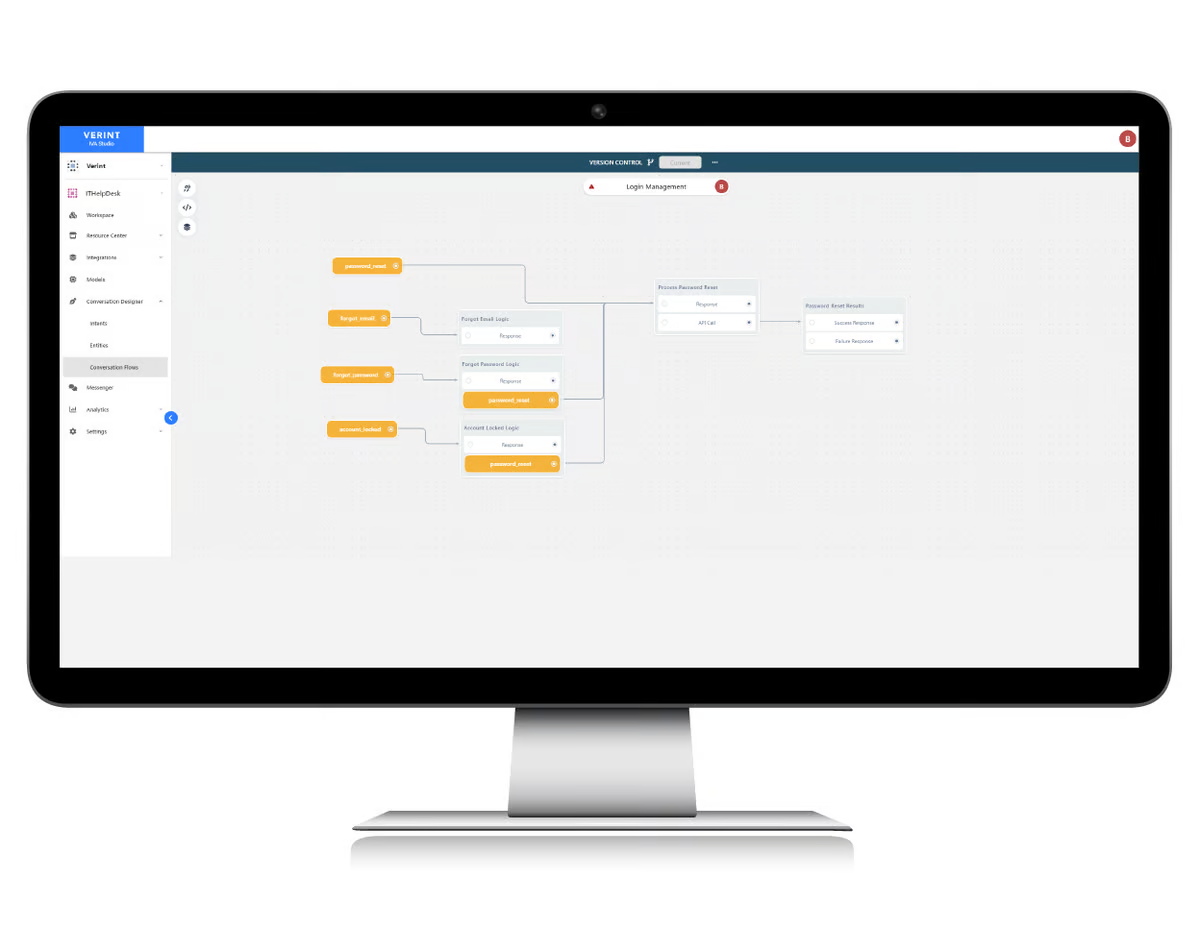All Posts
15+ Best Conversational AI Platforms | 2025


Conversational AI platforms are advancing the way businesses connect with customers, providing the tools to achieve a genuine one-on-one marketing feel. The market is expected to surge from $13.2 billion to $49.9 billion by 2030, enabling these platforms to transform customer service and business operations with precise, real-time solutions.
To help you navigate the endless options, we've curated a list of the best conversational AI platforms on the market. Each platform is uniquely designed to enhance customer interactions and drive meaningful engagement.
A conversational AI platform enables the creation and management of AI systems that simulate human-like interactions through text or voice. These platforms utilize advanced machine learning, natural language processing, and data analysis to understand and respond to user inquiries in a context-aware manner.
Conversational AI is designed to understand, process, and respond to human language, mimicking real conversations and improving through interaction. It relies on natural language processing (NLP) and dialogue systems to comprehend and engage in contextually relevant dialogue, primarily serving customer support and communication enhancements.
Chatbots, a subset of conversational AI, are typically designed for specific, rule-based tasks using simpler machine learning algorithms. They handle straightforward interactions but lack the depth to manage open-ended conversations like more advanced conversational AI.
Generative AI, on the other hand, represents a broader category that includes any AI capable of generating text, images, or other outputs based on training data. It excels in content creation, operating autonomously without direct human interaction. In short, conversational AI focuses on interactive dialogue, whereas generative AI showcases creative capabilities, generating independent content.
Conversational AI operates through a sophisticated interplay of technologies that enable it to simulate human-like dialogue. The process begins with natural language understanding (NLU), where the AI interprets the user's input to grasp context and intent. It then uses natural language generation (NLG) to formulate a coherent and contextually appropriate response.
These systems rely heavily on machine learning to continuously improve their responses by learning from each interaction, enhancing their ability to handle diverse and complex conversations over time.
Let’s take a look at the best conversational AI software and platforms on the market today.

Tavus is the best choice for developers looking to integrate lifelike, face-to-face conversation into their applications. Tavus puts developers first, with a straightforward Conversational Video Interface (CVI) API, making integration fast and reliable.
Tavus sets itself apart with CVI that sees, hears, and responds in real time—enabling human-like interactions with digital twins. You can quickly train a lifelike digital twin from a short, 2‑minute video or use a stock option, then generate videos or run live conversations at scale.
Tavus far exceeds traditional chatbots by adding visual and vocal nuance that fosters a more immersive, emotionally intelligent experience.

Key Features:
Pricing:
Deploy the Tavus CVI API today.

IBM Watsonx Assistant is a conversational AI platform designed to handle customer care across various industries. It supports non-technical users with drag-and-drop conversation builders and pre-built templates. This platform allows users to have a customer service option when human agents are not available.

Key Features:
Pricing:

Boost.ai offers a conversational AI platform for customer service and internal support. It’s engineered to provide round-the-clock customer support across various channels. With its natural language processing and understanding, Boost.ai can deliver context-aware interactions.

Key Features:
Pricing:
Contact Boost.ai sales team for pricing.

Google Dialogflow is a conversational AI platform that takes a state machine-based approach to agent design, offering explicit control over conversations. Dialogflow CX integrates with Google’s AI capabilities, including Large Language Models, to parse content, generate agent responses, and control conversation flow.

Key Features:
Pricing: Pay-as-you-go

Yellow.ai offers a conversational AI platform designed to automate both customer and employee interactions across various channels. This platform supports real-time, multilingual communication by leveraging AI capabilities. Yellow.ai markets itself for large enterprises.

Key Features:
Pricing:

D-ID enables conversational AI with digital humans. This platform combines D-ID's facial animation technology with speech and video, allowing users to engage with AI in a more human-like manner. D-ID is designed to create real-time conversations across various applications.

Key Features:
Pricing:

Amazon Lex provides a platform for building conversational interfaces into applications using voice and text. It leverages the same deep learning technologies that power Amazon Alexa, making it capable of understanding natural language. Amazon Lex offers the deployment of conversational bots for user experiences and business processes.

Key Features:
Pricing: Pay-as-you-go

Kore.ai offers a conversational AI and generative AI platform that allows businesses to automate interactions across customer and employee touchpoints. With integration capabilities, Kore.ai enables the creation of virtual assistants that can operate across multiple channels.

Key Features:
Pricing:

The OpenAI platform can generate human-like text through its language models such as GPT-3 and GPT-4. These models are trained on a range of internet text and fine-tuned for various applications to generate context-aware responses. The platform is designed to facilitate integration into existing applications.

Key Features:
Pricing:

Avaamo.ai offers a conversational AI platform tailored for large enterprises, facilitating integration across various business processes and communication channels. It leverages AI technologies to deliver virtual assistants that handle customer, employee, and patient experiences.

Key Features:
Pricing: Contact Avaamo team for pricing

Oracle Digital Assistant provides an AI platform to create conversational interfaces for business applications, integrating advanced natural language processing to support complex and natural dialogues. This platform handles the development of digital assistants, offering tools to integrate with Oracle's suite of applications and supporting customization through advanced analytics and machine learning.

Key Features:
Pricing: Starts at $0.02/Per request

Tars provides a conversational AI platform that is marketed for customer experience and employee productivity. Tars allows developers to ensure uninterrupted self-service access for users.

Key Features:
Pricing:

Aisera's Conversational AI platform is designed to automate and handle customer and employee experiences across various industries. It integrates advanced machine learning techniques, including natural language processing (NLP) and understanding (NLU), to provide intelligent and responsive virtual assistants. These assistants are capable of handling interactions in over 100 languages.

Key Features:
Pricing: Contact Aisera team for pricing

LivePerson's Conversational Cloud® uses AI to facilitate customer interactions across various digital channels. This platform is designed to assist contact center operations by enhancing agent productivity and automating customer engagement.

Key Features:
Pricing: Contact Liveperson team for pricing

Verint offers a conversational AI platform designed to handle customer service operations and experiences across multiple channels. It incorporates the Intent Discovery Bot, which utilizes AI to analyze engagement data—like call recordings, emails, chats, and support tickets—to identify what customers want and need.

Key Features:
Pricing: Contact Verint team for pricing
Conversational AI is taking over for good reason. There are many benefits of this technology that businesses and developers can enjoy like:
By automating routine inquiries, conversational AI allows teams to focus on more complex tasks with their audience. This boost in efficiency speeds up response times and increases the throughput of customer service operations.
Implementing AI-driven conversations cuts down on the need for extensive human customer support, reducing labor costs and decreasing the time spent on each customer interaction.
Conversational AI analyzes user data and previous interactions to tailor conversations, making each customer feel understood and valued. This personalization can significantly increase customer satisfaction and loyalty.
These platforms can gather and analyze customer interaction data in real time, providing businesses with insights to refine marketing strategies and improve product offerings.
With the ability to understand and react to customer needs accurately, conversational AI enhances the overall quality of service, leading to higher customer retention and a better brand reputation.
Let’s take a look at how conversational AI plays out in the real world.
Conversational AI can streamline product onboarding by guiding new users through features with interactive tutorials. For example, a software company could use AI to demonstrate tool functionalities step-by-step, reducing the learning curve. These systems can also answer FAQs on the new products, ensuring that new users receive the most relevant information right when they need it.
Conversational AI systems can offer 24/7 self-service or detect urgency in customer queries to route issues to the appropriate human agents. For instance, an AI system at an e-commerce company can handle common inquiries such as order tracking and returns, while immediately escalating complex concerns like payment issues to human specialists. This heavily reduces the amount of time it takes to respond to customers.
In sales and marketing, conversational AI can analyze customer data to offer tailored promotions and product recommendations. For a real estate company, AI could send a follow-up message on listings based on a user’s browsing history and preferences, driving them toward a purchase decision or connecting to a sales rep. This proactive approach in digital marketing campaigns can significantly increase engagement rates.
Conversational AI can reduce HR admin workload by automating initial screening processes, where it asks candidates preliminary questions and gauges their suitability before scheduling interviews. Additionally, it can provide ongoing support by answering employee inquiries about benefits, holiday policies, and training opportunities. This quick response time ensures employees have ready access to essential HR information without delays.
Let’s take a look at some frequently asked questions about conversational AI platforms.
Tavus is the best conversational AI platform for developers, thanks to its real-time CVI API that brings humanlike, face-to-face communication into any app. With Tavus, you can train a digital twin in minutes or use a stock option to deliver emotionally intelligent interactions that see, hear, and respond like people—at scale.
AI, or artificial intelligence, encompasses a broad range of technologies that simulate human abilities like learning, adapting, and problem-solving.
Conversational AI specifically focuses on simulating human-like conversations, enabling dynamic interactions through text or voice.
Yes, ChatGPT is a type of conversational AI developed by OpenAI. It uses deep learning to generate human-like text responses based on the input it receives.
An example of conversational AI is a customer service chatbot that can handle inquiries and provide support without human intervention.
The best conversational AI platform is Tavus, thanks to its innovative Conversational Video Interface (CVI) API and strong developer support. Tavus differentiates itself with unique, real-time video interactions that enable developers to make conversations not only smarter but also more human.
By integrating real-time video with conversational AI, developers can offer an unparalleled user experience that goes beyond traditional text-based interactions. Additionally, the exceptional support from the Tavus team ensures developers have the resources they need to succeed.
Discover how Tavus can elevate your customer service and transform your interactions.